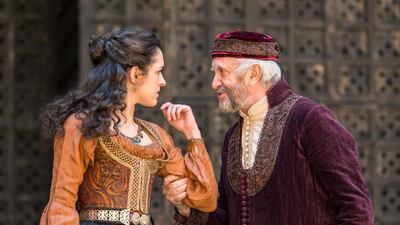When my students don’t like something we’re reading in class, they dismiss it by saying they “couldn’t relate”. It’s as if they can’t possibly keep reading if they don’t see their own lives immediately reflected back to them.
That’s why I wasn’t surprised when, at a student discussion about Sophocles’s Antigone that took place a few days before the recent performance of Noche Flamenco’s Antigona, several students admitted that they hadn’t read the play (despite it being required for class) because they “couldn’t relate”.
Antigone is the story of two brothers who kill each other in a civil war over the throne of Thebes, leading the new king, Creon, to declare that one brother is a traitor who should be left unburied on the battlefield while the other brother should be buried as a hero. Antigone, sister to the dead brothers, vows to bury her brother in defiance of the king, who imprisons Antigone for breaking his laws. As you might expect in a tragedy, pretty much everyone dies, with the exception of Creon, who is left alone to face the consequences of valuing order and obedience over the bonds of family.
Noche Flamenco took the story and wrapped it in the emotion of flamenco, an art form with its roots in the Iberian Peninsula’s mix of cultures and traditions. So we’ve got an ancient Greek tragedy being told by a group of mostly Spanish artists, using an art form that started in the 15th century as a response to violence and oppression, being performed on a stage in Abu Dhabi to a polyglot audience of all ages. How to “relate”, indeed.
But it is precisely that question of “relating” that explains why these ancient texts stay with us. Whether we realise it at first or not, these texts stay alive to us because they always give us a way in, even if it may take us a while to find that entry point. These ancient stories give us ways to think about our own lives– and the lives of people very different from ourselves.
Who among us hasn’t wrestled with the question of where to put our allegiance, for instance: what would we do if we were forced to choose between honouring country (the laws of Creon) or family (respect for the dead brothers) or faith (the need to bury the dead)? What does the play reveal to us about the consequences of war, or the qualities of a good leader, the struggles between generations? At the same time, when we read the play, we also feel the weight of the world as Sophocles may have felt it; we are in his world and our own.
Art allows us that simultaneity and also gives us something that we can draw into ourselves and make our own. It reveals to us the human ability to create beauty even in the midst of – or in response to – infinite suffering and loss. The arts are different from the disciplines of Stem (science, technology, engineering and maths), which governments everywhere these days are pointing to as the keys to the future. Stem may help us to diagnose and measure the world, but the arts help us to understand both ourselves and those who are very different from ourselves. At the end of Antigona, for instance, I even felt a gleam of pity for Creon, left shattered and alone onstage, a king who had not intended to become a tyrant. I’m not sure I could “relate”, exactly, but the performance had opened up the possibility of empathy.
Ironically, of course, it was in part Creon’s inability to empathise with Antigone that led him to his final despair: the play creates in us what its own world lacks. Empathy seems in short supply in our own world, too: will we end up like Creon, who remains king but at unconscionable cost?
Ancient Greece and 15th century Spain are long gone, and most of us will never move with the percussive grace of Noche Flamenco’s principal dancer, Soledad Barrio, but the story they tell remains our story. We might not want to “relate,” but we should.
Deborah Lindsay Williams is a professor of literature at NYU Abu Dhabi

